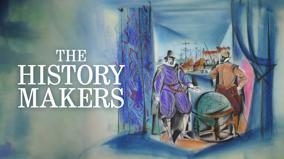Lord Durham
This short drama is a portrait of colonial administrator, Governor General and statesman Lord Durham (1792-1840). When Durham recommended self-government in Canada, he closed the door on his own political success. But in the end, the policies he declared for Canada became the pattern for self-rule in the rest of the Commonwealth.

-
 The History Makers1959 3 editions
The History Makers1959 3 editions
Details
-
directorJohn Howe
-
producerJulian Biggs
-
executive producerGuy Glover
-
scriptCharles E. Israel
-
cameraReginald Morris
-
sound recordingLeo O'Donnell
-
sound editingSidney Pearson
-
re-recordingGeorge Croll
-
musicJoan Edward
-
castÉmile GenestPaul GuèvremontAnne MorrishBarry MorseJoseph ShawPowys Thomas
Education
Lord Durham is often referred to as “Radical Jack”; how accurate is this nickname, given what is seen in this film? Create a Venn Diagram that outlines the role of the Governor General during Lord Durham’s time and in the present. Review the relationship between Francophone and Anglophone Canadians at this time. Using the Durham Report research how Lord Durham investigated the Rebellions of Upper and Lower Canada. What were the outcomes of his investigation? What were his views on self-rule/responsible government and how did this influence other members of the Commonwealth? Consider viewing the following films at the same: Lord Durham, Louis-Joseph Papineau: The Demi-God, William Lyon Mackenzie: A Friend to His Country and Robert Baldwin: A Matter of Principle. Organize a class debate with each group representing one of these politicians.


















